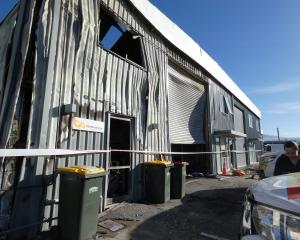An Albert Town man who faces having his foot amputated after falling at work 18 months ago will receive almost $50,000 from his former employer, Delta.
In the Queenstown District Court on Tuesday the Dunedin City Council-owned infrastructure company was fined $35,000 and ordered to pay reparation of $49,600 to Vincent Moore.
That followed a sentencing hearing on May 16, after which Judge Christina Cook reserved her decision.
At the hearing, an emotional Mr Moore read his victim impact statement, in which he said he knew he would "never be the man I was'' before the incident in November 2014.
Mr Moore, who had worked for Delta for 15 years, had been completing a service connection in Cardrona, but had not disconnected the power supply before working on the line.
A WorkSafe New Zealand investigation found he had been using a crescent spanner and made contact with the line, resulting in a low-voltage arc which caused him to fall to the ground.
He suffered compound left leg fractures and a fractured lumbar vertebra.
Mr Moore was still unfit for work and may lose his foot.
Delta admitted a charge of failing to take all practicable steps to ensure Mr Moore was not exposed to the hazard of low-voltage electricity while at work, laid under the Health and Safety in Employment Act 1992.
In court last month, the 56-year-old said he was "at a complete loss''.
"My life has changed so drastically since the incident.
"I watch my wife doing heavy and much-needed work around our large property and ... the house knowing this work is what I should do ... and [I] can't do anything to help.
"I don't have a job any more. I don't have a career any more. I've lost my purpose.
"I know I will never be the man I was.''
Mr Moore said immediately following the incident he was flown by helicopter to Dunedin for emergency treatment and surgery. Multiple complications had required ongoing treatment.
To date that had been unsuccessful, which meant amputation was a real possibility.
He said he was unable to drive, suffered nausea, anxiety and depression, had difficulty sleeping and putting shoes and socks on.
He had numbness down his leg and, once fit and active, he now struggled to walk more than 100m.
Mr Moore and his wife had purchased their "dream home'', based on his previous income which they would have to sell because his injury and his age would make it "very hard'' for him to gain employment.
Despite that, he remained grateful for what he did have.
"I know I may lose my foot, but I'm alive, I can walk, I have my wife and my family love me.''
WorkSafe chief inspector Keith Stewart said in a statement yesterday Delta should have had an effective policy in place that required Mr Moore to eliminate the risk of such an incident.
"In this case, that would have meant disconnecting the power completely at the road.
"None of Delta's written policies specifically required elimination, nor any explanation of how the hazard could have been eliminated.
"Elimination of any hazard at work is always preferable to isolating it and Delta could have prevented this unfortunate incident if it had provided written guidance on how to eliminate the risk of low voltage arcing,'' Mr Stewart said.
In court, lawyer David Robinson, on behalf of Delta, said "nothing can take away'' from the regret felt by the company and it was accepted reparation and a fine needed to be paid.
While not wanting it to appear as though there was "some sort of shifting of blame'', he submitted Delta was not an "errant defendant'' and there were contributing factors caused by Mr Moore.
"The difficulty is that the requirement for the [ladder] to be tied to the post and for fall-arrest equipment to be used lies squarely with Mr Moore.''
In a statement yesterday, Delta chief executive Grady Cameron said the company regretted the incident and the safety of its employees was "our No1 concern''.
"As an organisation, we are highly committed to keeping our people safe. We make regular and ongoing improvements to our safety practice, training and equipment to avoid such incidents,'' Mr Cameron said.
"We are very disappointed that despite these efforts, in this instance, the required procedures and training for this type of work were not followed.''
Following the incident Delta completed an internal investigation and further strengthened its work practices.
Mr Cameron said a new Live Low Voltage Work Standard had been introduced, which clarified when personnel would or would not work on live lines at low voltages and the steps they would take when carrying out that work.
In October 2011 Delta was fined $75,000 after admitting failing to take all practicable steps to ensure the safety of its employees while at work following the death of Alexandra lineman Roger Steel.
Mr Steel had been working on his own on December 9, 2010, strapped to a concrete power pole which toppled over. He fell 15m and died as a result of his injuries.
The company had failed to red-tag the pole as unsafe to climb and failed to formally notify Mr Steel, on his job sheet, of problems with the pole.
The company paid $148,300 to Mr Steel's family.












